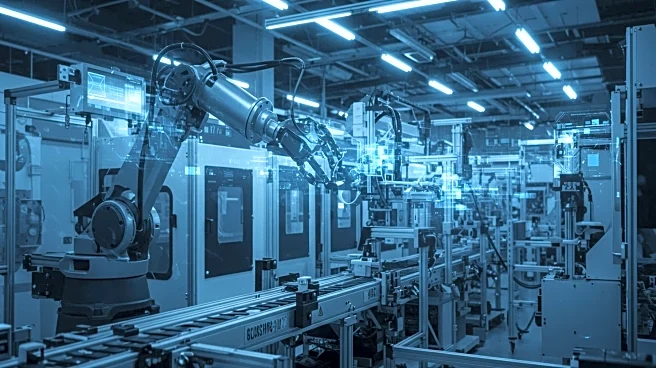What is the story about?
What's Happening?
The U.S. manufacturing sector is undergoing a significant transformation as companies increasingly turn to smart factories to address global supply chain disruptions. These smart factories leverage advanced technologies such as artificial intelligence (AI), digital twins, and automation to enhance production efficiency and resilience. The shift is driven by the need to move beyond traditional reshoring strategies, which have proven insufficient in the face of modern challenges. By integrating real-time feedback and rapid iteration processes, these factories aim to make onshore production more adaptive and robust. The focus is on empowering frontline teams and utilizing cutting-edge technology to redefine American manufacturing, moving away from nostalgia towards innovation.
Why It's Important?
The adoption of smart factories in the U.S. is crucial as it addresses the vulnerabilities exposed by recent global supply chain disruptions. By investing in AI and automation, manufacturers can mitigate risks associated with inventory shortages and production delays. This shift not only enhances the competitiveness of U.S. manufacturing but also supports economic growth by creating more resilient supply chains. Small businesses, which have been significantly impacted by tariffs and supply chain issues, stand to benefit from these advancements. The move towards smart onshoring is also aligned with broader economic and policy trends that prioritize domestic production and technological innovation.
What's Next?
As the trend towards smart factories continues, it is expected that more U.S. manufacturers will adopt these technologies to remain competitive. This could lead to increased investment in AI and automation solutions, further driving innovation in the sector. Policymakers may also play a role in supporting this transition through incentives and regulations that encourage technological adoption. The ongoing evolution of smart factories will likely influence global manufacturing dynamics, with the U.S. positioning itself as a leader in advanced manufacturing technologies.
Beyond the Headlines
The shift towards smart factories raises important ethical and cultural considerations, particularly regarding the impact on the workforce. While automation can enhance efficiency, it may also lead to job displacement, necessitating retraining and upskilling programs for affected workers. Additionally, the integration of AI in manufacturing processes poses questions about data privacy and security, which will need to be addressed as these technologies become more prevalent.















